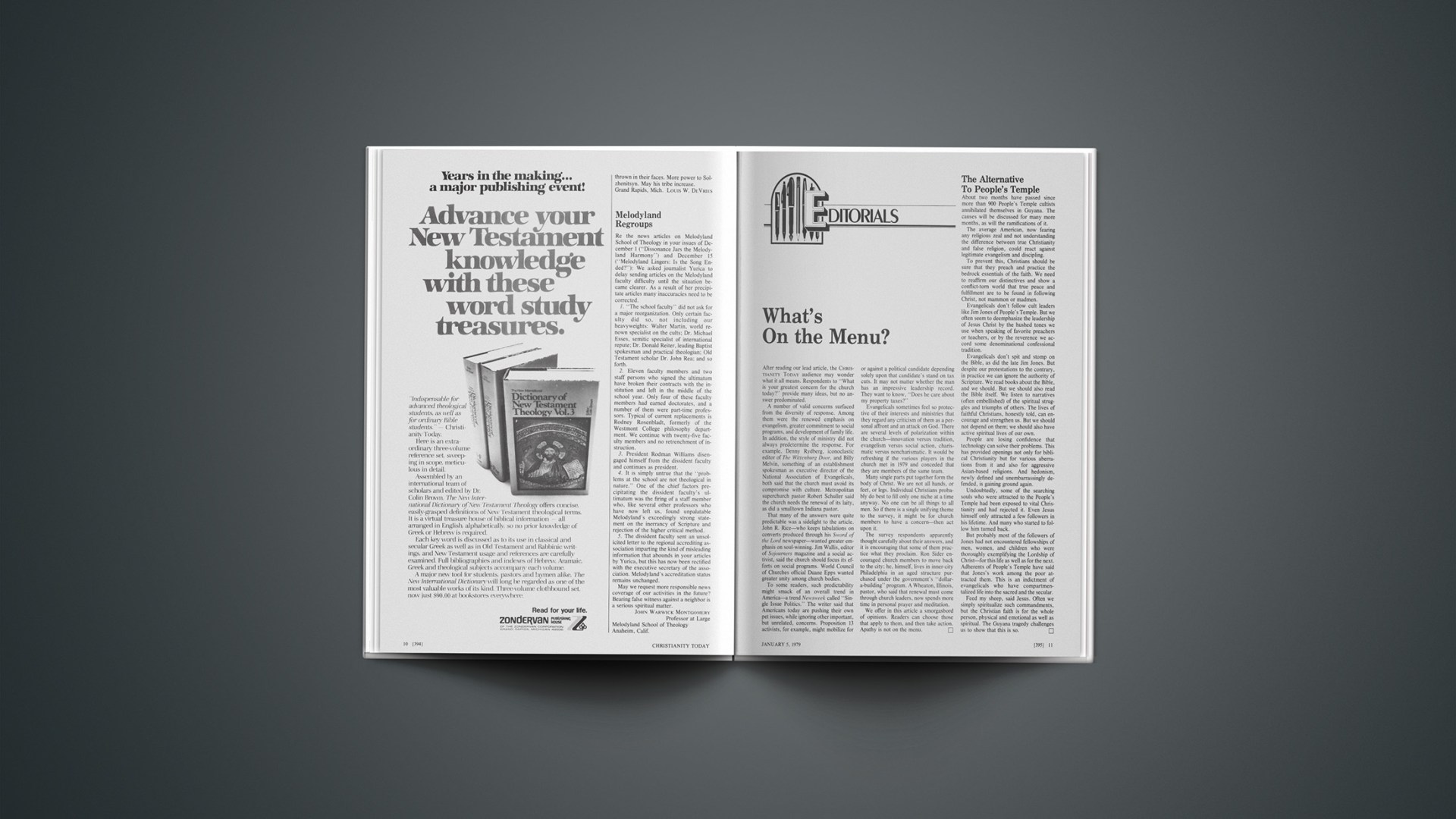After reading our lead article, the CHRISTIANITY TODAY audience may wonder what it all means. Respondents to “What is your greatest concern for the church today?” provide many ideas, but no answer predominated.
A number of valid concerns surfaced from the diversity of response. Among them were the renewed emphasis on evangelism, greater commitment to social programs, and development of family life. In addition, the style of ministry did not always predetermine the response. For example, Denny Rydberg, iconoclastic editor of The Wittenburg Door, and Billy Melvin, something of an establishment spokesman as executive director of the National Association of Evangelicals, both said that the church must avoid its compromise with culture. Metropolitan superchurch pastor Robert Schuller said the church needs the renewal of its laity, as did a smalltown Indiana pastor.
That many of the answers were quite predictable was a sidelight to the article. John R. Rice—who keeps tabulations on converts produced through his Sword of the Lord newspaper—wanted greater emphasis on soul-winning. Jim Wallis, editor of Sojourners magazine and a social activist, said the church should focus its efforts on social programs. World Council of Churches official Duane Epps wanted greater unity among church bodies.
To some readers, such predictability might smack of an overall trend in America—a trend Newsweek called “Single Issue Politics.” The writer said that Americans today are pushing their own pet issues, while ignoring other important, but unrelated, concerns. Proposition 13 activists, for example, might mobilize for or against a political candidate depending solely upon that candidate’s stand on tax cuts. It may not matter whether the man has an impressive leadership record. They want to know, “Does he care about my property taxes?”
Evangelicals sometimes feel so protective of their interests and ministries that they regard any criticism of them as a personal affront and an attack on God. There are several levels of polarization within the church—innovation versus tradition, evangelism versus social action, charismatic versus noncharismatic. It would be refreshing if the various players in the church met in 1979 and conceded that they are members of the same team.
Many single parts put together form the body of Christ. We are not all hands, or feet, or legs. Individual Christians probably do best to fill only one niche at a time anyway. No one can be all things to all men. So if there is a single unifying theme to the survey, it might be for church members to have a concern—then act upon it.
The survey respondents apparently thought carefully about their answers, and it is encouraging that some of them practice what they proclaim. Ron Sider encouraged church members to move back to the city; he, himself, lives in inner-city Philadelphia in an aged structure purchased under the government’s “dollar-a-building” program. A Wheaton, Illinois, pastor, who said that renewal must come through church leaders, now spends more time in personal prayer and meditation.
We offer in this article a smorgasbord of opinions. Readers can choose those that apply to them, and then take action. Apathy is not on the menu.
The Alternative To People’S Temple
About two months have passed since more than 900 People’s Temple cultists annihilated themselves in Guyana. The causes will be discussed for many more months, as will the ramifications of it.
The average American, now fearing any religious zeal and not understanding the difference between true Christianity and false religion, could react against legitimate evangelism and discipling.
To prevent this, Christians should be sure that they preach and practice the bedrock essentials of the faith. We need to reaffirm our distinctives and show a conflict-torn world that true peace and fulfillment are to be found in following Christ, not mammon or madmen.
Evangelicals don’t follow cult leaders like Jim Jones of People’s Temple. But we often seem to deemphasize the leadership of Jesus Christ by the hushed tones we use when speaking of favorite preachers or teachers, or by the reverence we accord some denominational confessional tradition.
Evangelicals don’t spit and stomp on the Bible, as did the late Jim Jones. But despite our protestations to the contrary, in practice we can ignore the authority of Scripture. We read books about the Bible, and we should. But we should also read the Bible itself. We listen to narratives (often embellished) of the spiritual struggles and triumphs of others. The lives of faithful Christians, honestly told, can encourage and strengthen us. But we should not depend on them; we should also have active spiritual lives of our own.
People are losing confidence that technology can solve their problems. This has provided openings not only for biblical Christianity but for various aberrations from it and also for aggressive Asian-based religions. And hedonism, newly defined and unembarrassingly defended, is gaining ground again.
Undoubtedly, some of the searching souls who were attracted to the People’s Temple had been exposed to vital Christianity and had rejected it. Even Jesus himself only attracted a few followers in his lifetime. And many who started to follow him turned back.
But probably most of the followers of Jones had not encountered fellowships of men, women, and children who were thoroughly exemplifying the Lordship of Christ—for this life as well as for the next. Adherents of People’s Temple have said that Jones’s work among the poor attracted them. This is an indictment of evangelicals who have compartmentalized life into the sacred and the secular.
Feed my sheep, said Jesus. Often we simply spiritualize such commandments, but the Christian faith is for the whole person, physical and emotional as well as spiritual. The Guyana tragedy challenges us to show that this is so.










